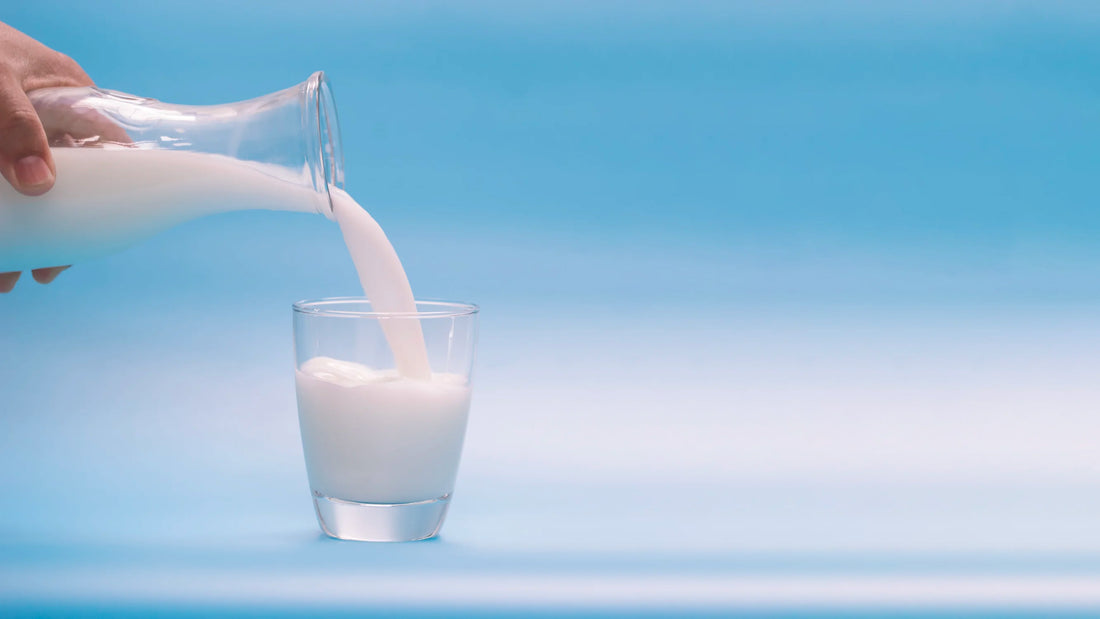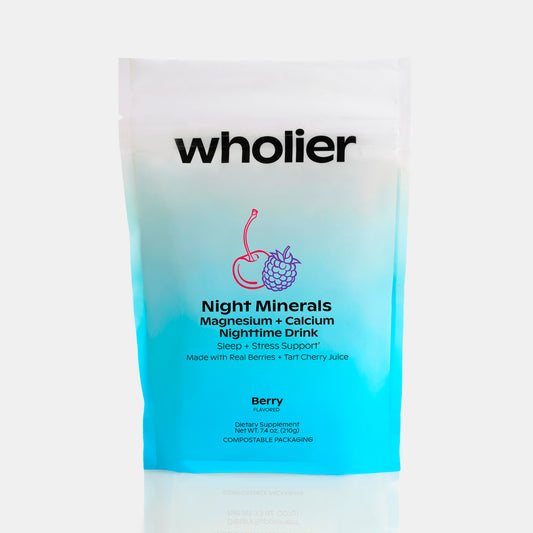
Vegan Sources of Calcium: Are You Getting Enough?
When we think of calcium, our minds often jump to images of milk and other dairy products. But what about those who follow a vegan diet? Is it possible to get enough calcium without consuming animal products? The answer is a resounding yes, and we're here to show you how! This article will cover what calcium is, how much you need daily, vegan sources of calcium, and the benefits of supplementation.
What is Calcium, and Why Do We Need It?
Calcium is an essential mineral that plays a vital role in maintaining healthy bones and teeth, supporting muscle function, and regulating nerve signaling (1). It's also necessary for blood clotting and maintaining normal blood pressure levels (2). Given the wide range of functions calcium has in our body, it's crucial to ensure we're getting enough.
How Much Calcium Do We Need Daily?
The recommended daily allowance (RDA) for calcium varies depending on age and sex. Here's a quick breakdown (3):
- Children (ages 1-3): 700 mg
- Children (ages 4-8): 1000 mg
- Adolescents (ages 9-18): 1300 mg
- Adults (ages 19-50): 1000 mg
- Women (ages 51-70): 1200 mg
- Men (ages 51-70): 1000 mg
- Adults (ages 71+): 1200 mg
Is It Challenging to Get Enough Calcium as a Vegan?
Many people believe that a vegan diet lacks calcium and may struggle to meet the recommended daily intake. Dairy products are often considered the primary source of calcium, and without them, it may seem challenging to get enough. However, this belief is far from the truth. A varied vegan diet can provide adequate calcium through various plant-based sources.
While it's true that some calcium-rich foods are animal-based, it's also essential to recognize that calcium is a mineral that plants absorb from the soil. Therefore, it's possible to obtain calcium from plant-based sources such as leafy greens, legumes, nuts and seeds, fruits, and fortified foods. By incorporating these foods into your daily meals, you can easily meet your calcium requirements without relying on dairy products.
What Vegan Foods Are High in Calcium?
Here's an extensive list of vegan foods, grouped by food categories, that are excellent sources of calcium, along with their calcium content per serving:
Leafy Greens:
- Collard greens - 266 mg per 1 cup cooked (4)
- Kale - 180 mg per 1 cup cooked (5)
- Bok choy - 158 mg per 1 cup cooked (6)
- Turnip greens - 104 mg per 1 cup cooked (7)
- Spinach - 99 mg per 1 cup cooked (8)
Legumes:
- Tofu made with calcium sulfate - 434 mg per 3.5 ounces (9)
- White beans - 81 mg per 1/2 cup cooked (10)
- Chickpeas - 80 mg per 1 cup cooked (11)
- Navy beans - 62 mg per 1/2 cup cooked (12)
Nuts and Seeds:
- Almonds - 96 mg per 1/4 cup (13)
- Sesame seeds - 88 mg per 1 tablespoon (14)
- Chia seeds - 177 mg per 1 ounce (15)
- Brazil nuts - 45 mg per 1/4 cup (16)
Fortified Foods:
- Fortified plant-based milk (soy, almond, or oat) - 300-330 mg per 8-ounce glass (17)
- Fortified orange juice - 300 mg per 8-ounce glass (18)
- Fortified cereals - 100-1000 mg per serving, depending on the brand (19)
Fruits and Vegetables:
- Figs - 121 mg per 1/2 cup dried (20)
- Broccoli - 62 mg per 1 cup cooked (21)
- Oranges - 74 mg per 1 large fruit (22)
- Sweet potatoes - 76 mg per 1 cup cooked (23)
Grains:
- Amaranth - 116 mg per 1 cup cooked (24)
- Teff - 123 mg per 1 cup cooked (25)
- Quinoa - 31 mg per 1 cup cooked (26)
- By incorporating these foods into your daily diet, you can meet your calcium needs without relying on dairy products.
What does 1000 mg or more of calcium look like in a day?
To help you reach your daily calcium goals, we've put together a one-day vegan meal plan that includes calcium-rich foods in every meal, so you can easily incorporate them into your diet.
- Breakfast: Chia Seed Pudding with Almond Milk (377 mg)
- 3 tablespoons chia seeds (177 mg)
- 1 cup fortified almond milk (300 mg)
- Sweeten with maple syrup, and top with your choice of fruits and nuts
- Lunch: Tofu and Veggie Stir-Fry (375 mg)
- 3.5 ounces tofu (434 mg)
- 1 cup cooked broccoli (62 mg)
- Stir-fry with your choice of vegetables and a delicious sauce on a bed of brown rice
- Snack: Almonds and Dried Figs (217 mg)
- 1/4 cup almonds (96 mg)
- 1/4 cup dried figs (121 mg)
- Dinner: White Bean and Kale Soup (261 mg)
- 1 cup cooked kale (180 mg)
- 1/2 cup cooked white beans (81 mg)
- Prepare a warming soup with onions, garlic, vegetable broth, and your favorite seasonings
This one-day meal plan provides approximately 1230 mg of calcium, exceeding the daily recommendation of 1000 mg for adults aged 19-50. By incorporating calcium-rich vegan foods into your daily meals, you can easily meet your calcium requirements without relying on dairy products.
Should You Consider Calcium Supplementation?
While it's possible to get enough calcium from a vegan diet, some individuals may benefit from supplementation. For instance, those with limited access to calcium-rich foods or those with specific health conditions may need additional support. If you decide to use a supplement, it's essential to consider the forms and bioavailability of calcium.
What Should You Look for in a Calcium Supplement?
Calcium supplements come in various forms, including calcium carbonate, calcium citrate, calcium lactate, and calcium gluconate. Calcium carbonate is the most common and least expensive form, but it requires stomach acid for proper absorption, so it's best taken with meals (27). Calcium citrate is more easily absorbed and can be taken with or without food (28).
As for bioavailability, a supplement's calcium content doesn't necessarily reflect how much your body can absorb. Look for supplements with added vitamin D, magnesium, and other essential nutrients that support calcium absorption (29). Night Minerals contains a blend of both chelated calcium and magnesium to help you meet your daily needs.
Getting enough calcium as a vegan is not only possible but can be easily achieved with a well-rounded diet that includes various plant-based sources of calcium. If needed, supplementation can help bridge any gaps in your calcium intake. Our Night Minerals drink is an excellent addition to your vegan diet, ensuring you get the calcium and other essential minerals you need for optimal health.
Sources:
(1-3) National Institutes of Health. "Calcium: Fact Sheet for Health Professionals." Office of Dietary Supplements. https://ods.od.nih.gov/factsheets/Calcium-HealthProfessional/.
(4-8) Ware, Megan. "Top Plant-Based Sources of Calcium." Medical News Today. Last modified January 9, 2020. https://www.medicalnewstoday.com/articles/322585.
(9) National Institutes of Health, "Calcium: Fact Sheet for Health Professionals."
(10-18) Ware, Megan. "Top Plant-Based Sources of Calcium." Medical News Today. Last modified January 9, 2020. https://www.medicalnewstoday.com/articles/322585.
(19) National Institutes of Health, "Calcium: Fact Sheet for Health Professionals."
(20-26) Ware, Megan. "Top Plant-Based Sources of Calcium." Medical News Today. Last modified January 9, 2020. https://www.medicalnewstoday.com/articles/322585.
(27-29) National Institutes of Health, "Calcium: Fact Sheet for Health Professionals."





